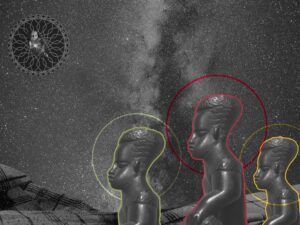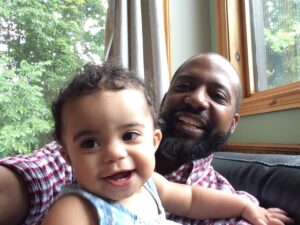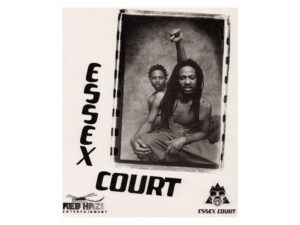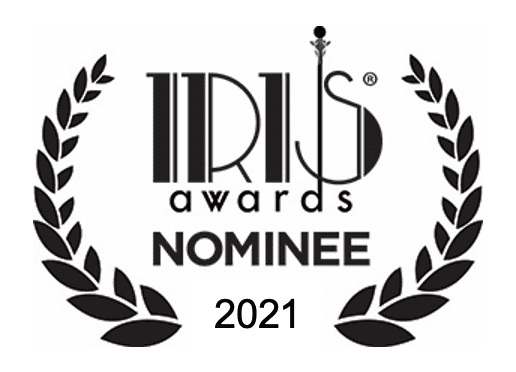When James Mosely launched his website, “
1 Autistic Perspective,” in January 2021, its title echoed a famous quote by Adelphi University professor Stephen Shore: “If you’ve met one person with autism, you’ve met one person with
autism.”
As Shore explained: “While the commonalities of people on the autism spectrum include differences in communication, social interaction, sensory receptivity, and highly focused interests, it’s important to understand that the constellation of these characteristics blends together differently for each individual.”
In Mosely’s case the result has been a unique perspective, one featured on his website’s blog, The Microcosm, which draws from the mosaic of his experiences as an autistic Black man and the intersection of his many roles: son, father, husband, artist, behavior therapist. He’s even shared his fixation with the number three.
“I wanted some way to share my experiences,” Mosely, 46, said of his motivation for creating the blog which explores his autism, work, and thoughts on social issues. “I write short, micro-blog posts. Quick reads designed to trigger thought and hopefully solutions.”
I didn’t think I was autistic because my professors described autistics as these helpless, goal-less, unmotivated, incapable “things” and I knew I was not that.
Mosely lives in Toronto, Canada, but was born in Windsor, a city in Ontario on the south bank of the Detroit River. Windsor is directly across from Detroit where his father worked as an audio engineer for “Hitsville U.S.A.” (the nickname of Motown’s first headquarters) before joining the Ford Motor Company, where he retired as the lead inspector of the Mustang at the company’s Dearborn Assembly Plant.
His mother’s family was among the first Blacks to settle in Canada; she grew up in the rural community of North Buxton which was established in 1849 as a community for and by former African American slaves who escaped to Canada to gain freedom. As Mosely put it, “It’s great Black history.”
Fatherhood@Forty recently spoke with Mosely to learn more about his life and work—including being diagnosed as autistic at the age of 41. What follows is an edited transcript.
When did you become aware that you were autistic?
I’ve always known I was different. I never cared to play with peers because my interests never coincided with theirs. They liked sports and I loved biology. I could read at three (hyperlexia) and they couldn’t. I didn’t know about autism until I was into my second year at university. Even then, I didn’t think I was autistic because my professors described autistics as these helpless, goal-less, unmotivated, incapable “things” and I knew I was not that.
Then I began working with autistics through my behavior therapist work and I realized the professors had it all wrong. After working five years in the game I realized my mentors and so-called professionals also had it wrong. I went into private practice and was able to reach hundreds of young autistic minds. Rather than help them mask and hide who they are, I helped them see value in themselves and taught them to embrace their differences and be proud of exactly who they are.

“Mwanga Safi” – Digital Collage by James Mosely, 2019
How did you become diagnosed at 41? Did something happen that led you to seek a diagnosis?
At the age of 40 I began digging deep into my past and present. I wanted to change my future. All my life I’ve had extreme difficulty maintaining relationships. My most meaningful relationships ended rather abruptly, seemingly out of nowhere. I couldn’t grasp why. I’m very difficult to live with. I am a perfectionist who expects a lot out of the people in my life. I expect ten times more out of myself. I’ve always been driven. It was too much for my exes. They will all tell you I’m a great person, great dad, hard worker, but they couldn’t live with me. I sought help to understand why. The diagnosis made it all clear.
Believe in your child. Believe they are capable of far more than you imagine.
My knowledge and history make it very difficult for me to accept other ways of doing things. My rigidity stops me from accepting new ways of doing things. My mind goes over hundreds of scenarios of how things can be done and I do the one that causes the least amount of difficulty, takes the least amount of energy, etc. I try to be efficient so I can do other things. Classic traits for many level 1 autistics.
Now that I understand why I feel the way I do, I can control my emotions around those situations. For example, my wife does things very differently than me. She ends up with very similar results but I can’t bear to watch, so I don’t. It wasn’t that simple before I understood why I was being so rigid. I still prefer my way but now I can accept other ways, sorta. I remove myself from it and simply enjoy the end results.

Mosely and his youngest daughter.
As you grew from a child to a teenager to an adult, did you notice a shift in societal attitudes about autism?
I didn’t even know about autism until I was an adult. I’ve seen dramatic shifts in attitudes towards and about autistics throughout my 22-year career. I was often on the front line of those shifts in attitude. Many years ago, I stopped asking for autism awareness and demanded acceptance.
Some [parents of autistic children] are amazed at the things I’ve accomplished in my life but my question is, “Why don’t they see such greatness in their own kids?” They are equally capable. They may not choose to do what I’ve done but they can be great at whatever they choose for themselves. The world just has to believe.
What inspired you to become a behavior therapist and consultant? I understand you were part of a rap group in your 20s.
As I finished college and went to write university entrance exams to become an oceanographer (specializing in orcas), I received a letter from a university stating I’d receive an astronomical amount of transfer credits if I studied psychology with them. At the time, I had just become the first Canadian, along with my brother, to release a rap album independently and globally. Our group name was Essex Court. The National Library of Canada has us down as first to officially submit our work to them. Our hit song was called “Ghetto Goldrush.”
I was too busy to study orcas, so I went with child psychology. It was the easier route at the time. As I learned, I fell in love with the subject. You see, I wanted to work with wild animals because they wouldn’t judge me. Then I realized kids wouldn’t judge me either. It was perfect for me.

Mosely and his brother. Photo by Denise Grant.
When did you become a father for the first time? In what ways did fatherhood change your life?
I’ve been a father for thirty years now. My eldest child was born when I was sixteen. I actually missed his birth because I had a big biology test the day he was born. I’ve been a father longer than I’ve been anything else, except Black. Fatherhood changed everything for me. My youngest is three. Thirty years with my own and twenty-plus with the kids of clients. Kids are my life.
What has been your biggest challenge with being both Black and autistic?
My biggest challenge with being me has been accepting who I am. I don’t engage much with the outside world. Of course I do, to a degree. I work. I go out with my family. But I don’t get caught up in what goes on outside of my household.
What’s the one piece of advice you would give to parents who are raising autistic children?
Believe in your child. Believe they are capable of far more than you imagine. Believe they can change the world if given the opportunity. Believe in your ability to provide those opportunities.
Learn more about James Mosely at Celebrate Your Autism
— An edited transcript published March 20, 2021
— Photos and images courtesy of James Mosely
— Banner image: “Beckon” – Digital Collage by James Mosely, 2019
Father on,

1523 words





by James
Thank you, Johnathon, for sharing a bit of my story with your audience. 🙏🏾
by Johnathon E. Briggs
You’re welcome, James. Glad we were able to connect. Onward and upward!